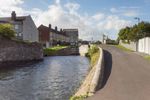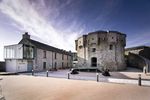Cycleway National Galway to Dublin - Mullingar Bike Hire
←
→
Page content transcription
If your browser does not render page correctly, please read the page content below
National Galway to Dublin
Cycleway
What is the National Galway-Dublin Cycleway?
The proposed National Galway to Dublin Cycleway will be Ireland’s first ever dedicated inter-city
route for cyclists and walkers. Stretching 276km across the country, the Cycleway will be a world
class amenity for families, communities and tourists to enjoy. Cyclists and walkers will be able to
go between Galway and Dublin without using roads. Stretching from the west coast to east coast,
the route takes in counties Galway, Roscommon, Westmeath, Meath, Kildare and Dublin , alongside
canals, rivers, disused railway lines and on purpose-built cycle paths, experiencing rural peace and
tranquillity in a safe, scenic and traffic-free environment.
The Cycleway will offer a variety of economic and social benefits, from employment to health,
across all local communities. There is a variety of existing service offerings along the proposed
route in cities, towns and villages and the Cycleway will encourage the creation of further services.
The Cycleway will attract recreational tourists from around Ireland and abroad, and increase economic activity across the country.
Visitors are familiar with the Cycleway concept, with over 45,000km of cycle paths and thousands of further kilometers planned
across Europe. Closer to home, the Great Western Greenway in County Mayo attracted 225,000 visitors in 2014 alone. International
research by Fáilte Ireland identified the importance of the cycleway being safe and scenic, providing opportunities for visitors to
interact with local people and experience the local heritage and culture.
This is an exciting and ambitious project, overseen by the National Roads Authority (NRA) on behalf of the Department of
Transport Tourism and Sport (DTTAS) in partnership with local authorities along the route and reflects the policy of the 2009 - 2020
National Cycling Policy Framework. One of the key objectives of this framework is to ensure that by 2020 nearly 10% of all journeys
will be by bike. Another key component of this framework is an inter-urban cycle network that will be appealing to commuters
and leisure cyclists. The National Galway to Dublin Cycleway will be a significant part of the delivery of this aim of the framework.
A great deal of progress has been made, but there is still a lot of work to be done over the coming months. The vision is to create a
world-class amenity that will benefit the communities between Galway and Dublin and generate economic growth.
1Nure Wake House, Co Roscommon Phibsborough, Co Dublin
Features
◗ A purposeful recreational facility for use by both cyclists and walkers
◗ 91km of towpath along the Royal Canal Network
◗ 45km of disused railway line from Mullingar to Athlone
◗ 140km of new build Cycleway from Athlone to Galway with new bridges
across the rivers Shannon and Suck
◗ Regular service facilities
◗ Scenic views of diverse landscape including coastline, boglands, woodlands and watercourses
◗ Towns and cities featured on the route include Dublin, Maynooth, Mullingar, Athlone,
Ballinasloe, Loughrea and Galway
What the National Galway-Dublin Cycleway
means for Landowners
◗ The Cycleway will cross significant lengths of privately owned farmland between Galway and Athlone. The selection
of the route for the Cycleway is being carried out in consultation with landowners and communities. The initial public
consultations in 2014 identified a wide corridor for potential routes between Galway and Athlone.
◗ The State is making a substantial investment to provide this major facility. Because of this, and for suitable long
term management and maintenance, the route needs to be in public ownership. This is best achieved through
acquisition of the land by means of the compulsory purchase legislation. This legislation provides landowners
with a mechanism to be compensated for their land. Landowners can expect to receive fair and reasonable
compensation for their land and any disturbance, severance and injurious affection incurred.
◗ Further consultations will be held with landowners to refine the route. As the cycleway caters for walkers and
cyclists there is relative flexibility in its location. This flexibility will facilitate minimisation of impacts on individual
farm holdings and their operations.
◗ We want to hear from you. It is important that you fully understand how the Cycleway might affect you and it is
important that we hear your concerns and suggestions. Please take the time to email us with your comments:
info@galwaytodublincycleway.ie
Further contact details are provided towards the end of this information leaflet.
◗ Management and maintenance of the Cycleway.
The local authorities will be responsible for the management, operation and maintenance of the Cycleway.
Waterways Ireland will be involved in maintaining the Cycleway along the towpath for the Royal Canal.
2Clonmacnoise, Co Offaly
What the National Galway-Dublin Cycleway
means for Local Families & Communities
Good for local families & communities One of the great benefits for each community will be the availability of
the Cycleway for residents to commute to school, to work, to the shops and for leisure, whether they’re on foot or
on a bicycle.
Good for the local economy and local jobs The Galway to Dublin Cycleway has the capacity to attract large
numbers of visitors – leading to increased revenue for a variety of local businesses and the opportunity for new
small business start ups … culminating in more jobs locally. For example, local communities and towns across
Co. Mayo have benefited from the success of the Great Western Greenway, which opened in 2010. This initiative is
estimated to be worth €7 million per year to the local economy and has created an estimated 38 new Full-Time
Equivalent (FTE) jobs, with a further 56 existing FTE jobs being sustained; significantly improving the local business
community and local jobs.
Visitors along the Cycleway will be seeking authentic, local experiences by interacting with local communities and
local people. This will present more opportunities for diversifying into sought after services from refreshments to
accommodation to farm experiences and guiding.
What the National Galway-Dublin Cycleway
means for the Region
The opening of the National Galway to Dublin Cycleway will enhance the connections between regions,
counties and towns. People will be able to cycle safely cross-country from Galway to Roscommon, through to
Meath and on to Dublin. The proposed route was chosen to deliver a memorable experience, enhance rural
connectivity, incorporate services at regular intervals, and to give greater public access to our natural and
cultural heritage.
The development of the National Galway to Dublin Cycleway will also create regional employment benefits
during the construction and operational phases.
Cycling and Tourism
Research shows that cycling in Ireland is a very popular choice for overseas visitors. In 2011, an estimated
173,000 visitors to Ireland engaged in cycling while spending approximately €200 million. The National Galway
to Dublin Cycleway will be an attractive, scenic and appealing route with many attractions for overseas visitors to
experience. The National Tourism agencies are committed to working with businesses and communities as well
as the NRA and local authorities in their collective efforts to deliver a high quality tourism experience and
maximise the opportunity to market and sell cycling holiday experiences to international visitors.
3Longwood Aqueduct, Co Meath
Oranmore Castle, Co Galway
Project Status
The National Galway to Dublin Cycleway project will be delivered in seven separate sections. The development of this
project is widely supported and significant progress has been made to date.
Here is a status update on each of the seven sections:
1. Dublin to Maynooth: 26km in length. 0.3km at Sheriff Street and 2km between Ashtown and Castleknock,
Dublin opened in 2014. The remaining 23.7km are at various stages of planning and are being developed by the
National Transport Authority (NTA).
2. Maynooth to Meath/Westmeath county boundary: 38km in length. Planning approval has been received.
Construction can commence, pending availability of funding.
3. Meath/Westmeath county boundary to Mullingar West: 27km in length. This section was opened in 2014.
4. Mullingar to Garrycastle, Athlone: 40km in length. This section is under construction and is scheduled to
open in summer 2015.
5. Garrycastle to Athlone Marina: 4.5km in length. The planning process is to be carried out on the preferred
route by summer 2015.
6. Athlone Marina to Athlone Castle: 0.5km in length. The Environmental Impact Statement (EIS), for this section
which includes a new bridge over the River Shannon, is currently being prepared and submission to An Bord Pleanála
is planned for May 2015.
7. Athlone Castle to Galway City: 140km in length. The first public consultations on the proposed corridor took
place during October 2014.
National Mullingar
Galway to Dublin Athlone Maynooth Ballinasloe
Athlone
Mullingar
Maynooth
Cycleway
Galway City
Ballinasloe
Dublin City
Galway City
Loughrea
Dublin City
Loughrea
Hill of Down, Co MeathCycleway under construction Co Westmeath Athlone Castle, Co Westmeath
Next Steps
Planning and preliminary design work is underway for sections 5, 6 and 7 of the Cycleway. The exact timing of the Cycleway
development and opening of the remaining sections depends on the success in identifying a feasible route and securing the
necessary planning approvals and funding.
In particular, in relation to the Galway to Athlone section:
◗ Local authorities will continue to meet with landowners along the corridor and, in consultation with
the landowners, endeavour to identify a feasible route option that should address their concerns.
◗ Local authorities will be assisted by Consultancy Service Providers within the Agricultural and
Environmental Services area.
◗ Preliminary design and environmental studies will be progressed along the route.
◗ Once a feasible route option is identified, further Public Consultation will be held and the final
preferred route selected.
◗ The local authorities will then seek planning approval and land acquisition approval from An Bord Pleanála.
◗ If planning approval is granted, compensation negotiation will commence, along with detailed design
and construction as funding becomes available.
For more information visit: www.galwaytodublincycleway.ie
Loughrea, Co Galway
Loughrea, Co Galway
5National Galway to Dublin
Cycleway
Shop Street, Galway City
Mullingar
Athlone Maynooth
Ballinasloe
Galway City
Dublin City
Loughrea
Samuel Beckett Bridge, Dublin City
Contact Us: The Project Engineer The Project Engineer The Project Engineer
Galway-Dublin Cycleway Galway-Dublin Cycleway Galway-Dublin Cycleway
We would recommend you contact us in Galway Project Office Roads and Transportation National Roads Office
writing with your suggestions, concerns Galway County Council Roscommon Co Council Westmeath Co Council
and queries either by email at: Corporate House Courthouse Culleen Beg
Ballybrit Business Park Roscommon Mullingar
info@galwaytodublincycleway.ie or
Co Galway Co Roscommon Co Westmeath
Tel: 091 509594 Tel: 090 6637157 Tel: 044 9334250
For more information visit: www.galwaytodublincycleway.ieYou can also read



























































